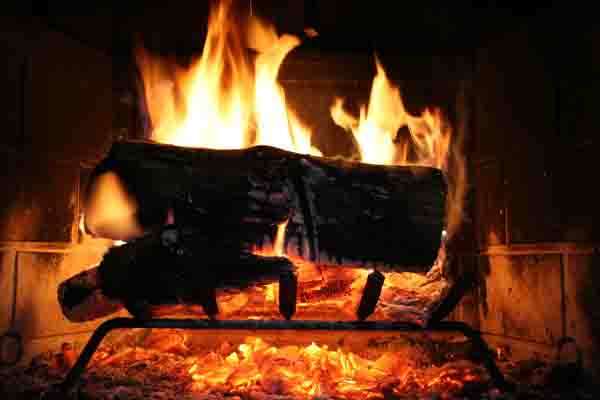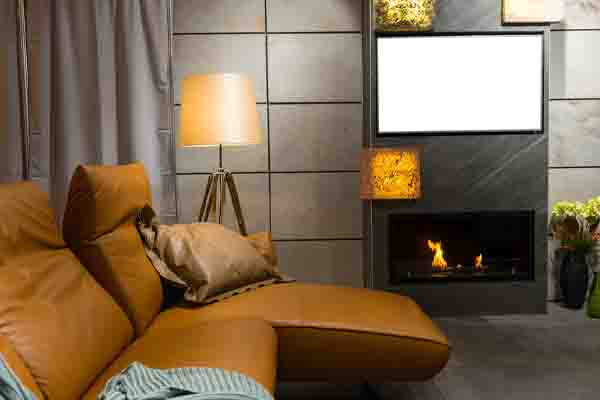Fireplace Vs. Furnace: Which Is More Efficient?

Do you have a winter-ready home? You will notice a gradual drop in temperatures over the next month. During the peak of the winter, snow may cover your driveways and the streets surrounding your home. You will likely spend more time indoors just to avoid the cold. You want to keep your home warm using a heat source that doesn’t cost a fortune. Many homes are equipped with both furnaces and fireplaces. Both forms of heating offer compelling features and noteworthy setbacks. A common query homeowners have about these two heating sources is which one is more efficient.
Read on to see a comparison between fireplace vs furnace efficiency from a practical point of view.
Fireplace Vs. Furnace: Which Is More Efficient?
Contents
One of the top criteria when selecting a heating system is energy efficiency. This is because of the soaring energy prices in almost all countries worldwide. Rising inflation and unpredictable supply are valid concerns. You want equipment to ensure a comfortable home without burning a hole in your wallet. If not, you may not be able to have sustainable home heating.
High-efficiency systems also generate lower carbon emissions. This is highly beneficial, especially if you care about your environmental impact. Therefore, you should pay attention to the efficiency ratings. Sometimes, when comparing systems, there is a clear winner. Other times, there is a close and negligible gap, so you will need to select a system based on other factors.
Wood Fireplaces: Beautiful Yet Inefficient

Fireplaces are a classic. After all, many people have been relying on firewood for warmth and light for thousands of years. It is a simple and effective method wherein all you need to do is chop wood, throw them into the fireplace and light them up. The smoke escapes via a chimney, so all that is left in your home is warmth and light. The dancing flames also offer a hypnotic effect that can leave you in a trance. It provides a pleasant ambiance during cold winter nights or for entertaining guests. However, selecting a heat source shouldn’t be based on aesthetics only.
Wood fireplaces are highly inefficient. Studies say that only 25% of the heat that burning wood generates stays indoors. The rest escapes through the chimney with the smoke. Some cases can have the wasted heat be as high as 90%. Firewood is costly, so it is disheartening to pay so much and get so little out of it. You may want to look for more efficient solutions if you are budget-conscious. Keep in mind that visual appeal doesn’t compensate for the lack of efficiency, especially if better options are available.
Safety should also be a concern with wood fireplaces. They cannot be left unattended. You need to extinguish the fire if you are going to sleep or going out on an errand. If not, you won’t be able to stop the flames from spreading in case an emergency happens. There are low chances of this happening, but it has massive consequences, so the possibility of it happening cannot be ignored. You should consider how fireplaces affect indoor air quality as well. Most smoke moves up the chimney, but some carbon monoxide, ash, carbon dioxide, and VOCs may still be distributed throughout your house.
Gas Fireplaces: Better But Lacking

If you want the feel and look a fireplace brings without the hassle, consider getting a gas fireplace. This unit doesn’t burn wood, so there are no worries about releasing particles in the air. You also don’t have to worry about safety. This unit offers more convenience as you can rely on a steady fuel supply to keep the fire going. It may lack the charm crackling wood has, but it provides a higher efficiency level, so it converts heat better. Many consider this to be a welcome trade-off.
However, gas fireplaces have a 70% Annual Fuel Efficiency (AFUE) rating. This is a considerable jump from the wood fireplaces’ 10% to 25% efficiency, but still pretty low. You receive better benefits when you change the fuel source, giving you more bang for your buck. However, a gas fireplace isn’t the best option available. A gas furnace is still far better, boasting 80% to 98% AFUE ratings, depending on the model. If you can get advanced equipment, furnaces provide better value.
However, keep in mind that gas-powered fireplaces are still fireplaces. It can only warm up the immediate area. It isn’t a problem if you only want to warm a single room, like the living room, during family gatherings. It may also be enough to heat a small shed, cottage, or studio. However, it is not enough if you need to heat a standard family home with several rooms and floors. It is best to have a gas furnace as it can heat your whole house.
Furnace: The Best Option

Modern furnaces are versatile home heating systems. They come in various sizes, making it easy to find one that best suits your unique heating needs. The heating system utilizes a network of ducts and vents to circulate warm air to multiple rooms throughout your home. This means that a gas furnace offers a whole-house heating solution. It may not be as visually stimulating as a fireplace, but you get consistent warmth during winter. This lets you move around your home comfortably and sleep soundly at night.
A high-efficiency gas furnace can be up to 98% efficient. This lets you enjoy low fuel usage and reasonable energy bills, especially when compared to the other options. Using a gas-powered furnace makes it possible to keep the heating on all winter if needed. The long-term fuel savings compensate for the higher initial installation expenses, so you get excellent returns from your investment.
Conclusion
Logical homeowners aren’t carried away by the design of a heating source. After all, it impacts a home’s overall energy consumption and carbon footprint. Most savvy homeowners consider energy efficiency when choosing a heating solution that works best for their homes. The advantages that come with gas furnaces far outweigh both wood-buring fireplaces and gas fireplaces. Gas furnaces offer better air quality, safety, and convenience. Ensure you hire a reputable HVAC technician to conduct a scientific load calculation and properly install the furnace. Experienced professionals can help you achieve comfortable winters for years to come.
Call R.F. Ohl For All Of Your HVAC Requirements

When you need high-quality HVAC services in the Poconos and the Lehigh Valley, Pennsylvania, be sure to call R.F. Ohl. Our professionally certified technicians are knowledgeable and experienced in accurately servicing any heating and cooling system. Rest assured, we offer only superior-quality HVAC services, like furnace maintenance, boiler installations, mini-split repair, and more.
R.F. Ohl guarantees to have highly affordable HVAC service prices in the area. We offer tune-up services that can increase your home’s comfort, energy efficiency, and indoor air quality while reducing your energy expenses. If you need to repair or replace your HVAC system, we can recommend the most suitable one for your home within your budget. All our work is guaranteed because your satisfaction is our priority. Schedule a service appointment with R.F. Ohl today. Call now for a free, in-home estimate. Click the link to view our service area.
Click here to contact us today or give us a call at (610) 377-1098 if you have any questions.